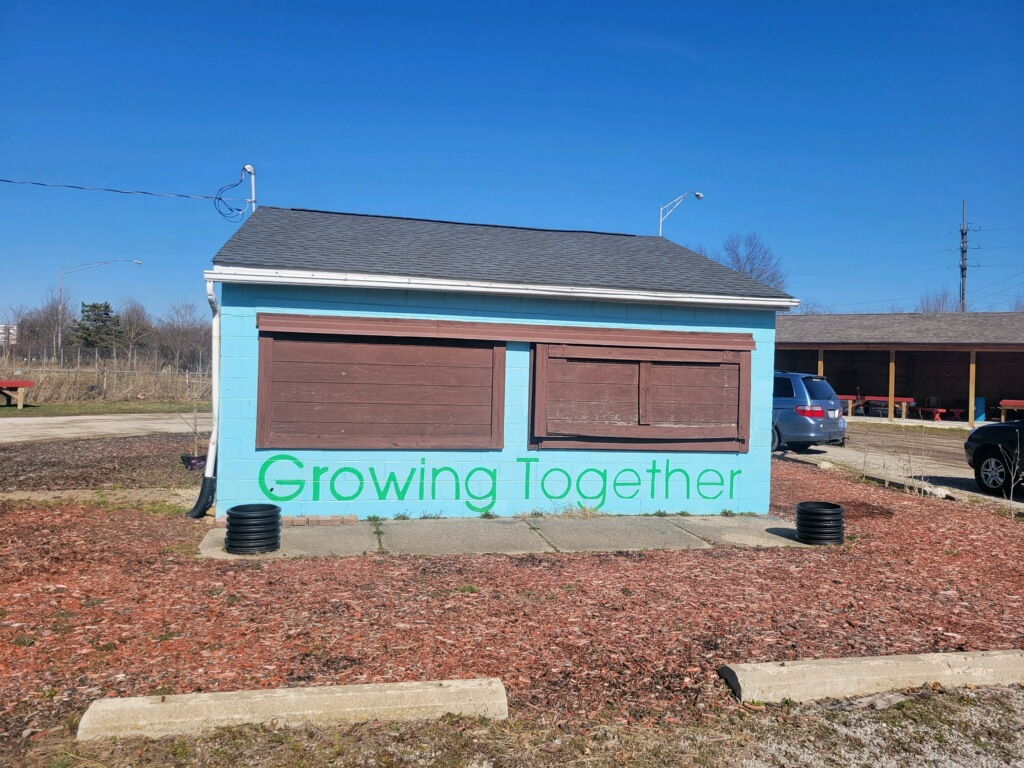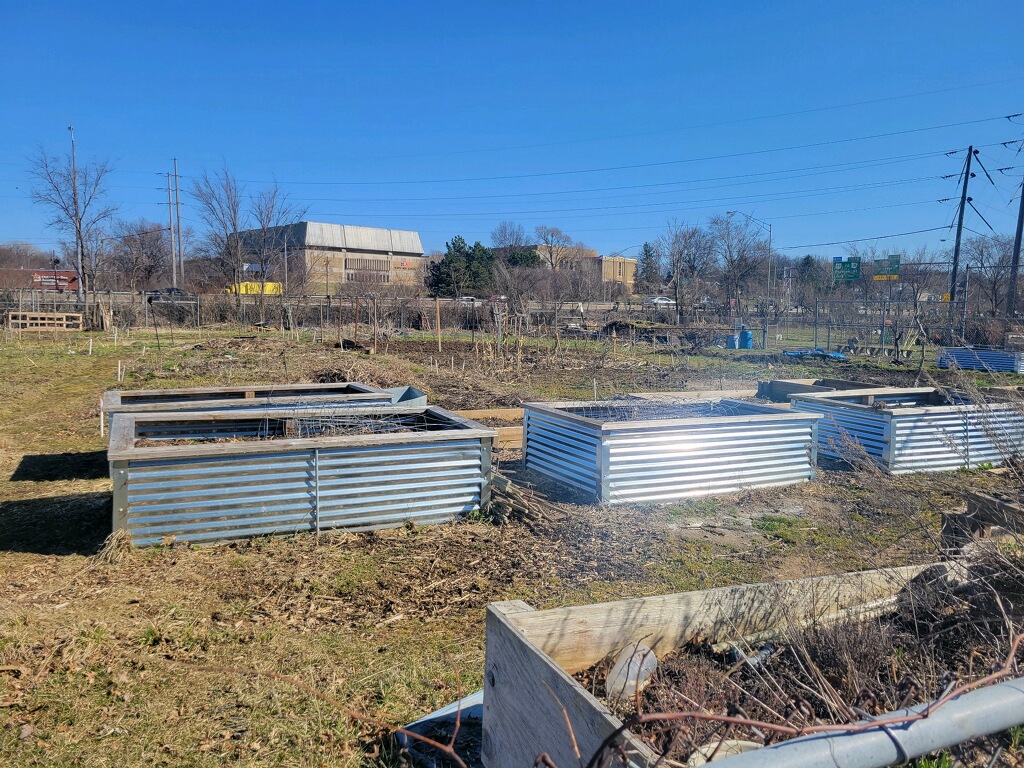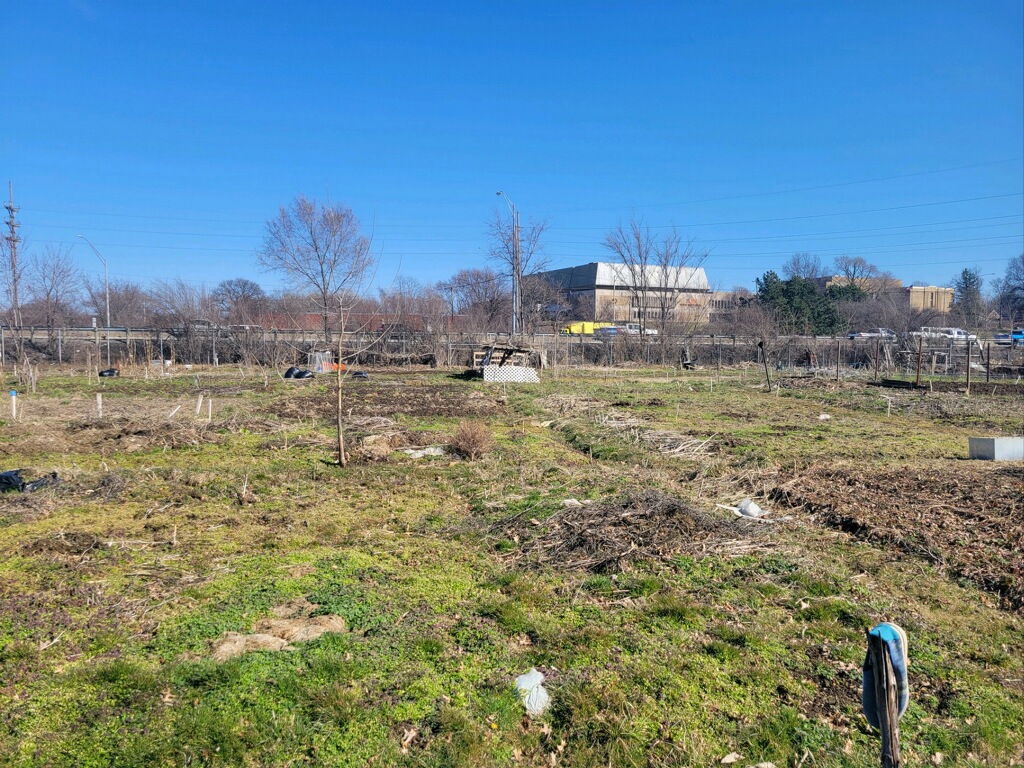By Alexandra Golden
When you drive into Akron Cooperative Farms, an old concession stand converted into a storage facility for seeds and supplies greets you.
“Growing Together” can be read on the facility in big green letters. To the left and right are old t-ball fields turned into plots of land for farming and hoop houses for growing.
Photo by Jacob Hansen
Overgrown fencing meets the eye behind the plots. A pavilion that was built for shelter and monthly gardener meetings is located behind the concession stand.
The Akron Cooperative Farms take up four Little League baseball fields and has 150 plots where 140 gardeners grow mustard greens, garlic and mustard seed, among other crops. It is a second home to refugees and members of the Akron community.
Amar, one of the gardeners, came from Bhutan in 2009 and knew Douglas Wurtz, the executive director of Akron Cooperative Farms, since before the farm was even an idea.
“[Wurtz] wanted a garden and I wanted the garden for my community,” said Amar.
How Akron Cooperative Farms came to be
Douglas Wurtz is truly the networking and connection man of North Hill. When Wurtz was employed with Time Warner Cable, now Spectrum, he assisted people at Namaste Properties, an apartment complex in North Hill. Wurtz noticed that someone who lived in the apartment was expanding an area to grow food.
Wurtz knew of other Nepalis who turned their backyards into gardens as well, so this was not a new thing to him.
“I knew that if I could help expand the small area in back of the apartment building, we could see a prolific garden,” Wurtz said.
This help with turning a vacant lot behind the property into a garden led him to the future of Akron Cooperative Farms. He met with the mayor about the Namaste garden project and his vision for creating more opportunities for gardening in the community.
“I submitted a proposal, and it was this spark that created the opportunity to use an underutilized ballpark that was being cared for, but with little community participation for eight years or more,” Wurtz said.
Formerly known as Sammis’ Park, the over four acres of land was rebranded and redone to become Akron Cooperative Farms.
“It was with great joy to hear the city was willing to lease Sammis Park to create a gardening enterprise that would benefit the community, especially in regards to refugees, since my wife and I had been volunteering with that community for the past 10 years,” he said.
The idea for the farm came from the mental health aspect that Wurtz saw when working at Timer Warner Cable.
“I was going into one of their homes, and whenever I went into one of these homes it was so dark. The older ones couldn’t speak any English and you could just imagine what it felt like.” Wurtz said. “So, when you can get outside, we have some of our older guys, they’re out here every day. They just love being out here. And it’s just a wonderful thing to see.”
Charles Roe, a friend of Wurtz and ex-director of the Akron Leadership Foundation, helped with the development and covering for the farm along with Bryson Davis, the founder of ALF, Wurtz said.
In September 2018, a large group of volunteers from the First Serve’s Day of Service came out to brush, clean and paint the buildings, and then in 2019, they built compost bins, a bench and spread gravel in the driveway.
Along with help from volunteers, in 2019 Wurtz had help plowing fields from a friend from Amish country, to help get things ready for the first growing season. At the same time, the West Akron Rotary Club gave the farms a grant for a professional tiller and lumber to build picnic tables.
The farm had problems with water supply for gardeners at the beginning, but a member from the rotary club had an irrigation company, Naragon Irrigation Co. They put in a system for them as a donation and there is water at every corner now.
Plots of land and composting
Over the four acres of land, there are various plot sizes.
Each plot size has a different price for the year-long lease, according to the website. A full plot is 20×20 feet at $50, half plots are 10×20 feet at $25 and raised beds are 4×8 feet at $20. The payment includes tilling of the soil before growing season, access to free seeds, use of garden tools, buckets and wheelbarrows, water, gardening assistance and coaching and farm events, the website stated.
The fees are how the farm gets revenue which is given back to the farm for different uses, Derrick said.
The hoop houses are not included in the plots, that space is more communal.
The raised beds were built by volunteers with a grant from Home Depot, Wurtz said. Some of the raised beds are being used by a North High class with students with disabilities.
Due to the increase in awareness in the community, there is currently a long waitlist for those who want a plot.

Photo by Jacob Hansen
The farm also has a focus on composting. The city provides the farm with leaves and wood chips for composting. Along with the city, VIGEO GARDENS, a company that grows microgreens in PRO-MIX soil, drops off trailers of the used soil for the compost.
They recently started a composting program and gave out buckets for collecting at the April monthly gardener meeting. They gave out informational sheets on what could and could not go in the compost.
“If we have 100 people bringing food waste, we’ll be able to make a lot of mull,” Wurtz announced at the meeting.
Mull is Nepali for compost.
The food waste will be added to the compost and will be mixed together by a tractor, he said.
Akron Cooperative Farms today
One of the many farmers that has a plot of land is Bikabe. He came from the Democratic Republic of Congo in October 2016. In that same year, he met Wurtz while Wurtz was working with Time Warner Cable. Wurtz gave Bikabe and his family internet, and their relationship grew from there.
Bikabe and his father each have one plot where they grow different types of plants and crops. One thing that they grow is an eggplant-type plant that is white. It is very popular in the Congolese community, he said.
When they were in Africa, Bikabe’s father picked up farming as a hobby, and so did Bikabe.
“I started agriculture back overseas, so I like farming,” he said.
Farming helped them adjust to Akron.
Everyone’s willing to work and get their hands dirty.
BOARD CHAIR MATTHEW DERRICK
“Coming here was a little bit hard,” Bikabe said. “Language barrier, cultural barrier, being in a new place.”
Along with farmers, members of the board help with farming, including board chair Matthew Derrick.
Derrick is a mortgage loan officer with about half of his customers being from the Nepali community. This is how he originally got involved with the community, and then he met Wurtz through networking. Derrick joined the board in the middle of last year but has been a part of the process since before they even got the land.
“The majority is Nepali and their background is agriculture,” Derrick said. “So we wanted to find something, a strength of theirs, a gifting and we’re utilizing it.”
The leadership throughout the group is what makes the farm thrive, he said.
“Everyone’s willing to work and get their hands dirty,” Derrick said.
Amar is another member of the board. He originally started at the farm as a gardener, but he is now an adviser for the board and was recently hired by the farm as a manager.
He came to the U.S. from Bhutan in 2009. Amar left Bhutan because of the “political conflict” specifically what happened in 1990. This time in Bhutan is referred to as the “ethnic cleanse.” This was when there was violent ethnic unrest and anti-government protest pressing for greater democracy and respect for Nepali rights in Southern Bhutan.
Before Amar even moved to Akron in 2016, he met Wurtz at one of Amar’s relatives’ funerals. After meeting there, they kept the connection all the way to the farm.

Photo by Jacob Hansen
The amount of land of all of the t-ball fields is about how much land one person had back in Bhutan, he said.
Amar has a plot of land at the farm still where he grows different crops. These crops include mustard seed, mustard greens and garlic. Along with this, he grows a different type of tomato plant.
“Tomatoes over here is sweet,” Amar said. “But our tomatoes are sour.”
Fundraising, events and future
The farm held an event on Sept. 10, 2022 called Pies & Pints to raise funding for the farm.
This year they are hosting the fundraiser with a new name — Harvest on the Hill.
There are farmers’ markets every Wednesday starting after July 4. This year, the first market will be July 5, with the last one on September 27, for a total of 12 weeks and 12 opportunities.
The farmers’ markets are called Hapi Fresh Market Day and are hosted with Asian Services In Action – ASIA. There are about a dozen vendors at these markets located at 743 Gaylan Drive, Akron, Ohio.
There are no current plans for expansion, but if land becomes available, that could change.
“If I can find a quarter acre, half acre, whole acre for some of these gardeners, I mean they would really latch on to that,” Wurtz said. “I’m always keeping my eyes out.”
